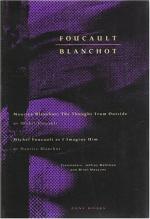|
This section contains 8,968 words (approx. 30 pages at 300 words per page) |

|
SOURCE: “Crossing the Threshold: On ‘Literature and the Right to Death,’” in Maurice Blanchot: The Demand of Writing, edited by Carolyn Bailey Gill, Routledge, 1996, pp. 70-90.
In the following essay, Fynsk examines the ambiguous nature of language, the function of literature, and the negative dialectic of death expressed in “Literature and the Right to Death.”
Literature begins, Blanchot says, when it becomes a question, when the language of a work becomes literature in a question about language itself.1 This question concerns the source of literature’s ambiguity: its ‘origin’ in an irreducible ‘double meaning’ that is not a movement between irreconcilable meanings, but between meaning and a ‘meaning of meaning’ that is itself irreducibly ambiguous, material and ideal, neither material nor ideal: a ‘point of instability’, a ‘power of metamorphosis’, an ‘imminence of change’ (pp.61–2/330–1) that gives itself in language beyond either the meaning language takes on, or...
|
This section contains 8,968 words (approx. 30 pages at 300 words per page) |

|


